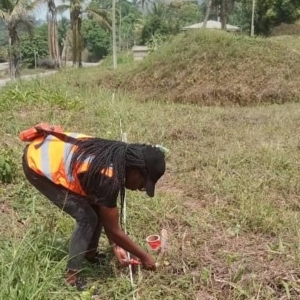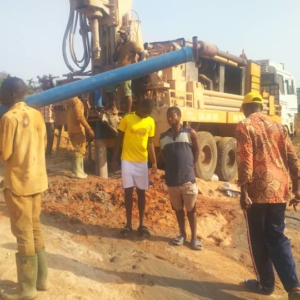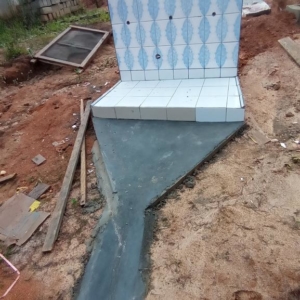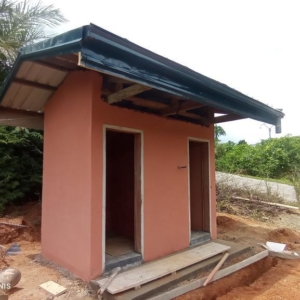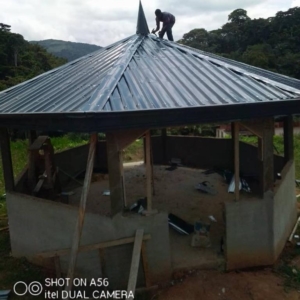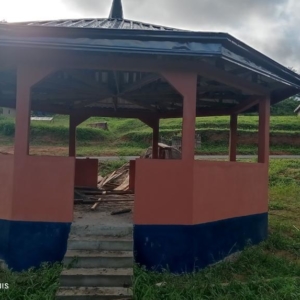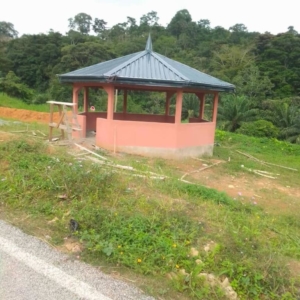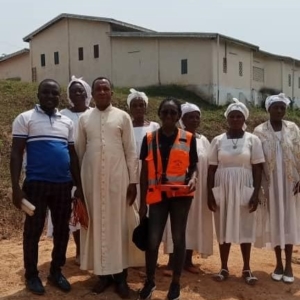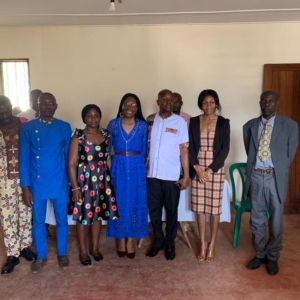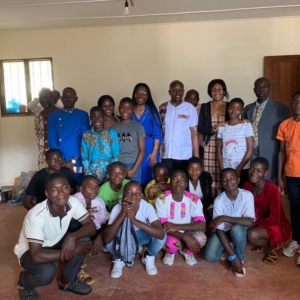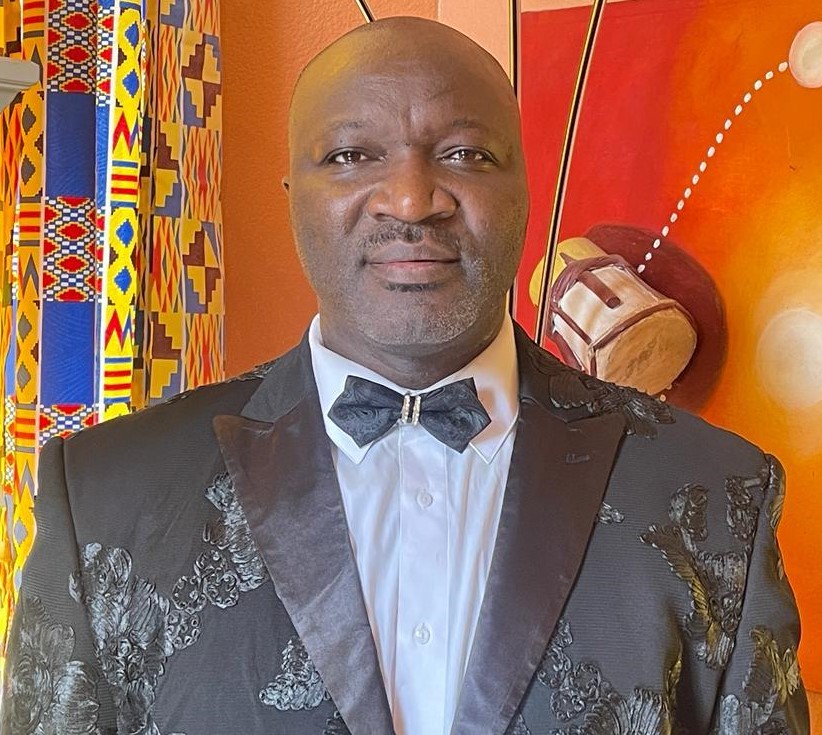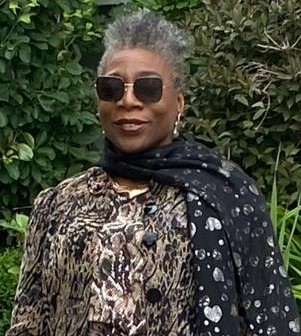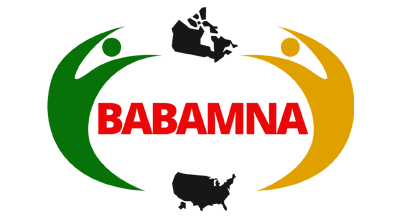We are proud to interview Mrs.Valerie Wehiong-Batta for our first Community Highlight.
Valerie is a proud daughter of the Community of Ndom in the Sanaga Maritime division of Cameroon. She has studied, worked and lived in three continents (Africa, Europe, North America), is a perpetual learner and holds three master degrees including in international development from the university of Konstanz in Germany, in dispute resolution from Southern Methodist University in Dallas, TX, and in global studies from the North Carolina State University in Raleigh, NC. For the last 12 years she and her family have been living in the city of Durham, North Carolina where she works for a joint program between NC State academics, the private industry and the Federal Government for security related issues.
Valerie is on a mission to give back to the community. She was inspired by women like her grandmother Mbombo Sue, a widow who raised generations of children while working from dawn to dusk at her farm. She is passionate about creating bridges, giving a voice to those who cannot tell their story with their own perspective and words, creating opportunities for those who are not given a platform to shine. She recently completed an important water project in her native village of Ndom to address an essential need for this community and a prerequisite to addressing other development issues. She shares with us her journey, how it inspires her and touches lives. She exhorts us to have a can-do attitude. <<We can change one community at a time; we can work in partnership, but we must also remember that we have seen people with just “one hand” do amazing things; so, while waiting for all the hands to join to the noble cause, of rural development, each one of us is able to support in any way that fits their ideal.>>
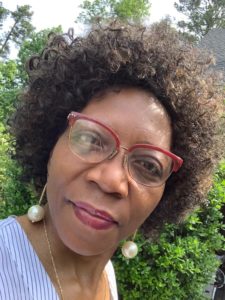
Who is Valerie Wehiong-Batta?
This is a question that deserves a more elaborate answer; I will be as explicit as possible.
I am a Cameroonian woman, an immigrant currently living in the USA; but I am first and foremost a village girl raised by the people of Ndom [i], a beautiful rural community in the Sanaga Maritime sub-region of Cameroon. Throughout my life, I have embraced multiple cultures, starting from my early years as a young student in, Ndom, Yaounde or Bertoua where I belong to the cohort of the first high school graduates (the lycée technique of Bertou), and later as a foreign student in Germany (Europe).
When I started my professional career working in the field of international development as young consultant, I was first assigned to assist in the restucturing of the Editions CLE (Centre de Litterature Evangelique) in Cameroon, which is by the way, the first publishing house in Central Africa; I was fortunate to work in other parts of the world as well, including in the war-torn Sierra Leone, witnessing the effects of the devastating civil war of the 80’s and 90’s, but also Botswana where I was stationed in the middle of the Kalahari Desert, contributing to sponsored projects aimed at promoting the SAN[ii] identity: the notion of culture, diversity, equity and access have been ingrained in me, and in how I view human interactions and inter-connections, long before they became required and mandatory training in today’s institutions. After settling in the US at the turn of the century, I jungled between motherhood, continuing education, and working to revamp my interrupted career. With multiple relocations (Maryland, Florida, Texas, Washington State, Puerto Rico, etc.) I put a break on my professional life and focused solely on taking care of my family; nevertheless that hiatus gave me a valuable excuse to explore the American higher education system.
For the last 12 years now, my family and I have settled in the city of Durham, NC where I currently hold a position at North Carolina State University. As a perpetual learner, I also hold three graduate degrees in international development from the university of Konstanz in Germany, in dispute resolution from Southern Methodist University in Dallas, TX; My most recent accomplishment is a third master’s degree in global studies from the North Carolina State University in Raleigh, NC. Prior to these academic achievements from foreign institutions, I proud myself as being one of the rare graduates of my generation, with a BTS from the university of Douala. I am a licensed and professional mediator, I have been investing my time in formally teaching about conflict prevention, resolution, and mediation, I have previously volunteered my skills at the NC district court. I have been silently working on strengthening relationships among people, especially between people of African descent and their allies, through webinars and workshops, and I have partnered with other entities including faith-based organizations to foster and encourage positive conversations among various groups.
Now that I have bragged about what I have, let me reiterate that the identity that I am proudest of is that of a mother of my four amazing children as well as other children that have been an important part of my life; I wholeheartedly enjoy being a Mom.
What are you passionate about outside work?
I undoubtedly want to inspire and connect people (and connect with people) by creating opportunities where they (we) can come together for meaningful exchanges. I admit that I do have different interests and they vary depending on a combination of many factors, including family needs, professional commitments and my general availability, but also keeping an open eye on global concerns; we live in a global world and I do not have the slight intention of dissociating myself with that reality. I am a very social person and every opportunity to get together with family and friends is always celebratory. There is something that is very consistent however, which is what I do intentionally every day: fostering relationships. I am mostly passionate about creating bridges; my goal is to encourage the sharing of experiences, of opportunities, giving a voice to those who cannot tell their story with their own perspective and words, creating pathways for those who are not given a platform to shine. I am a facilitator and I build community connections by being an ally to the invisible, and by empowering the oppressed and marginalized. I strive to connect people who are afraid of the other side, be it different or unknown, I look for resources for communities in need; I also use my transformative mediation skills to prevent violence when it is preventable and to support people in uncovering their hidden potentials and talents. I talk to my people and meet them whenever possible; throughout these (in)formal gatherings, I can diffuse disputes and solve problems.
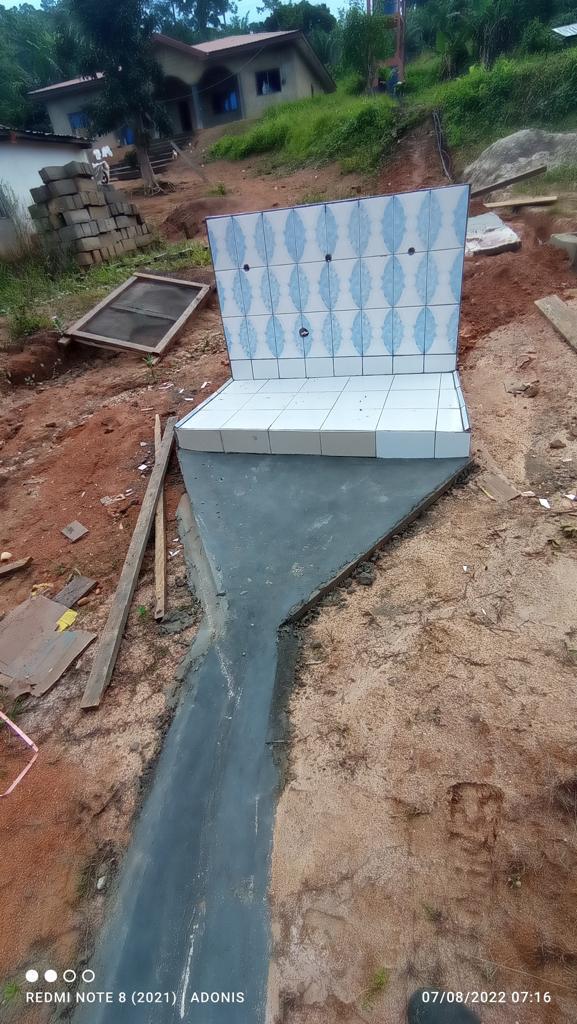
You recently completed an important water project in your native village of Ndom. Can you tell us a bit about the nature, the scope of this project and why it is important for the community?
Though the water project is the most recent, we have been working with the community of Ndom for almost 5 years. This water initiative consists of:
- A solar powered water forage
- 2 restrooms (Male/Female)
- A covered meeting space or “Libomna”
How did all of this start? What inspired you to carry out these community projects?
I learned throughout the years that there is no perfect time to give, so I went with my only enthusiasm. 5 years ago, we decided to do something and the first project revolved around the bilingual middle school (CES bilingue) where we built restrooms, and provided the school with ordinary supplies; it is an ongoing project with multiple focus points. We have also initiated the Suzanne Melanie Ngo Wehiong award that is given annually to the most academically performing student at the school; this award comes as a FCFA 50.000 scholarship, in addition to any other perks (courtesy of my family): Suzanne Melanie was the first female Lok-Nuk[iii] student at the local middle school[iv] to pass the state middle school official exam, known as BEPC[v] in 1976.
Having lived the life that I have briefly resumed, you can assume that I draw my inspiration from multiple sources, both individuals and groups; from extraordinary and ordinary people, some of whom are still invisible. My inspiration is primarily from the people that raise me up to become the person talking with and to you and to your readers;. As I said to the crowd during the inaugural Thanksgiving Mass on Janurary 29, 2023, this project is simply my way of thanking the Community of Ndom where I spent many memorable years; there is no other reason except that of a child wanting to give back to their community of origin, the eagerness to empower a community that gave me a strong start, a community with so much potential, yet still lacking that big push to jump the hoop. As I said when responding to your previous question, I want to connect people to resources; I want to share my experiences and influence lasting changes; I want to inspire just as I was inspired early on, by amazing people including my sassy grandmother Mbombo Sue, a widow who raised generations of children, while working from dawn to dust, a woman who could neither read nor write any of the languages used in school, yet she knew how to rate the success of her children by comparing their rankings to that of their peers. There are so many others who played big roles, but also less glamorous ones, in my village and in so many other places, there are groups like Mbai Bassa California and their leadership, there are countless names who have been extremely encouraging and for whom I am grateful.
I want to reiterate that I operate as an individual who is simply interested in doing something for our rural communities. Allow me to also disclose that I have not necessarily made public every project that I have initiated or involved with, fully or partially: for example, in 2021, I completed a research paper on pandemics in rural Africa and used Ndom as a case study. “All of us, together: fighting COVID-19 I Ndom” was completed in the Fall of 2021, presented in front of a jury; I am working on identifying appropriate partners for the implementation. A non-profit created in 2016 is slowly coming to light with focus on education and health. My drawers are still hiding many unfinished studies that need to be revamped in order to be implemented.
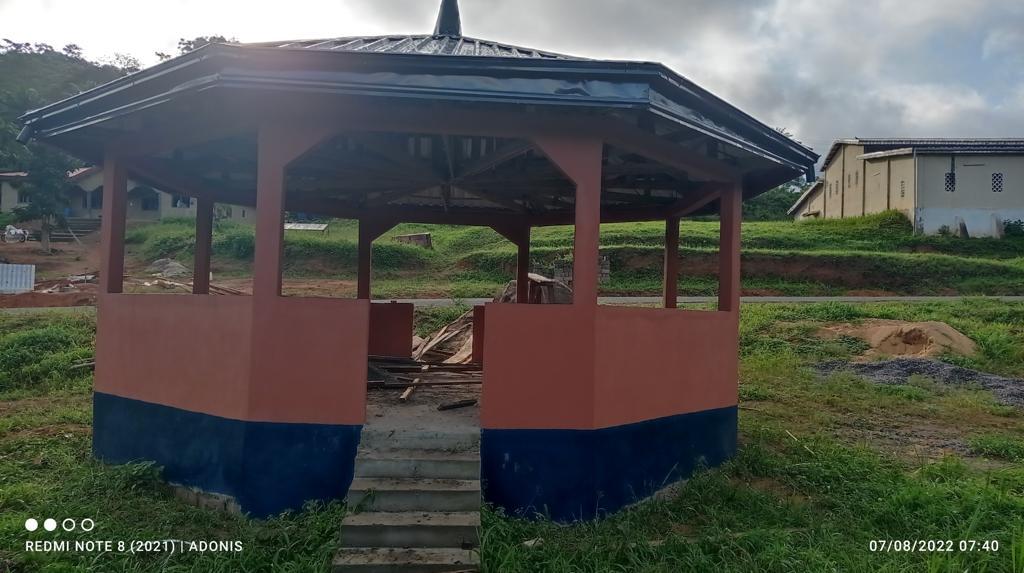
What kind of difficulties have you encountered and how have you resolved them?
Finding a reputable contractor was a daunting task. Ndom is a rural community and as such, it is a vulnerable environment where most services are either very primitive or just not available.
To provide key services, the community relies heavily on the outside world. One thing that we struggled with at the very beginning was identifying local contractors who would carry out this work, we could not locally find a technician to bid on the project, and when we were able to identify a skilled one, very far away, they did not have the basic logistics to perform the job. Thanks to some recommendations, we finally signed a contract in March 2022, but quickly learned that most performers prefer to not work with subcontractors, juggling multiple tasks including activities for which they may not have adequate skills: this has tremendously delayed the project; you should add to the list the lack of a rigorous planning of activities, the consistent price hike of building materials, due to a shortage exacerbated by the disruption of the supply chain worldwide. There is no magic solution as some of these issues are common in Cameroon; but thanks to our communication skills and the discipline of all stakeholders, we were able to minimize the negative effects of those shortcomings on the project’s outcome. We are happy to report that the project was ready in about 6 months.
Now that water is available, our main priority at this point is to focus on education about the safety of water, on community building, and on resource mobilization; we don’t seek to reinvent the wheel, we are ready to learn what others did and adapt it to our own reality. We have provided clean drinking water to the community so far, but we want to focus on supporting those who are utilizing and consuming it, especially assisting in providing tools on how to maintain its quality. As we know, water saves lives when it is clean, but it also takes lives when it is contaminated. Even if it has been demonstrated that groundwater is naturally protected from bacterial sources, monitoring is key. Our conversation now focuses on “maintenance”; we still need to raise funds for technical assistance, and any other repairs that may be needed along the way. Clean water and proper hygiene are linked, this is a motto that we hope will accompany this project and extend to other initiatives as well.
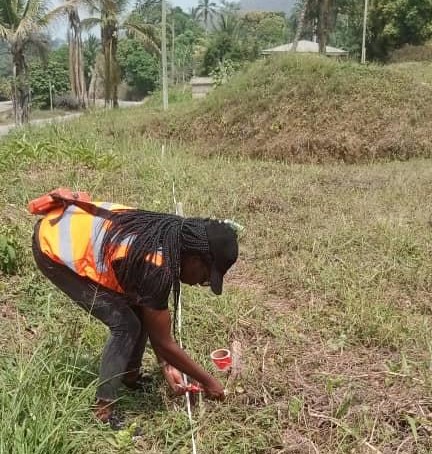
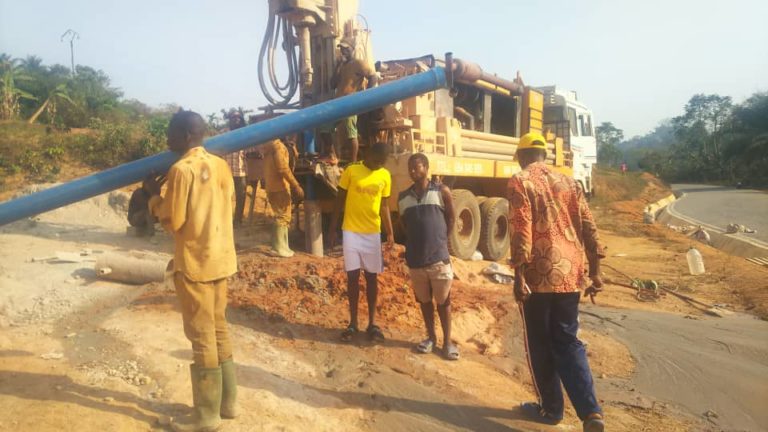
How did you raise funds for your projects?
This is a very complicated question, as my fundraising tactics did not meet any defined criteria traditionally used in raising funds. What I can however indicate is that because of an amazing relationship with two donors who were fascinated by the story of my early upbringing in Ndom (Cameroon), I was able to count on them in every aspect of this project. Beyond the financial assistance, they believe in the idea, and they push me to think outside of the box. Initially planned as a hand dug well, we were able to upscale for a solar power forage, we also benefited from the expertise and the financial assistance of an avid professional in the field who joined the team and was delighted to give advice and assist in the management of funds. In the end we were a handful of friends who put their friendship, time, passion, the willingness to give back, and “the nerve of the war” together to produce something more important than themselves.
How do you make sure your projects are carried out successfully and are sustainable?
I am going to admit that nothing is sure; however, the objectives that we want to reach are many, including empowering the community to find solutions that work best for them. I have started my professional journey in the field of rural project development; I have trained community organizations in identifying their own needs by designing their path to sustainable development; I am a certified ZOPP[vi], and in that process, I have also learned that each community is unique, special, have their own available skills and consequently is different; what is not different however is that the success of rural projects needs communities mobilization and involvement, a compassionate leadership, a holistic team approach and an understanding of the dominant culture. We are already working around these elements, and we still need partners to expand and reach more villages, because we know that the needs are tremendous and the resources to address those needs are scarce and limited. What we truly need is bringing together a blended group of stakeholders willing to work together and eager to create a common language when it comes to strengthening the community of Ndom. We also anticipate sharing our experience with or if possible, replicating the model in other villages once we have considerable information regarding the use of this facility.
What has been the social impact so far?
It is too early to draw a definitive conclusion; however, the first groups to benefit from having water closer to home are girls and women since they are the ones entrusted with the burden of working miles to collect water; less time spent on this task means more time for other activities, including resting and studying (this is especially true for school age-children).
Another immediate impact is the health of the population as access to clean drinking water reduces the propensity to waterborne diseases, improves hygiene, combats malnutrition: water is an essential element of any community, including their pride. Let’s not forget that basic activities of the economic and social life are centered around water, whether it is cooking, bathing, cleaning the house, washing clothes or building a house, water is essential: with the village experiencing less and less rain due to climate change, there is no doubt that this water project is a grain of hope in a place where countless development issues need to be addressed. What I know for sure, as far as I am concerned, is that “users’ testimonies are my personal barometer of the necessity and usefulness of this project.”
The World Health Organization (WHO) and the United Nations International Children’s Emergency Fund (UNICEF) Joint Monitoring Programme for Water Supply and Sanitation (JMP) qualifies as basic service, any drinking water from an improved source where collection time is not more than 30 minutes for a roundtrip including queuing[i]: according to this classification, our water project has not definitively solved the crucial issue of water access. We have reports of people working as far as 6 miles roundtrip to collect water, which indicates that we are at the limited water service level (collection time exceeding 30 minutes for a roundtrip). Even though we are aware of the challenges of reaching the level where water is on the premises, we are already brainstorming on how to increase water accessibility in schools, churches, and other public places by using other techniques, such as storage tanks.
How has this experience inspired you?
While being both essential and inevitable, change can also be uncomfortable, especially if uncontrollable. I enjoyed the process from the beginning to the end, especially learning about solar energy; there were many learning curves and Aha moments that gave me the opportunity to grow and revisit and review myself. We initiated and executed this water project and its additions over a period of 8 months, at a time where I was facing crucial health challenges: for better or for worse, this exercise has been my survival mechanism, a stage that allowed me to focus on something greater than the physical and mental pain I was experiencing. Now more than ever, I am also embracing my role as a community activist or leader (whatever works best), although I am well aware of the hicks that may come with it; it is not a new role, at times, I may not have prioritized it because of other constraints, but it is a role that I will not switch for any reason; it fits me like “a sur-mesure”. As a community woman and leader, as an educator, as a longtime learner, as a parent and mother,, oh yes, as a rural-raised girl, I stand on the shoulders of so many, committed to making a difference in the lives of rural inhabitants. As far as I am concerned, this is not an identity change, this is a continuity and an expression of who I have always been but expressing it with different tools.
Any final thought? What is your message to your fellow members of the Bassa Bati Mpo’o community in North America?
To my Basa’a Bati Mpo’o Community (es), I will proudly say:
“Thank you for your individual and collective inspiration”
“You can do it.”
“We can do it.”
“We can change one community at a time; we can work in partnership with others, but we can also remember that we have seen people with just “one hand” do amazing things; so while waiting for all the hands to join to the noble cause of rural development, each one of us is able to provide their support in any way that fits their ideal. If you have one hand, use it; if both hands are functional, it is even better. If you have others joined like my friends did in this case, it is perfect. We can share experiences in so many creative ways. There is no one-fit-all model or or one single solution when it comes to empowering a community, there are multiple options, and each one of us is capable of finding something workable, something that is unique and valuable.
My final thought goes to the Mbai Bassa California Community. I may not find the right words to express my gratitude towards your organization and leadership, but allow me to thank you for challenging all of us to think creatively and to work hand in hand. You have given me many opportunity to express myself before by publishing an article on “solidarity among people of African descent; and telling my story here one more time, is a powerful opportunity to encourage, inspire, empower and connect, but also a powerful way to raise funds as I know, someone would be reading this article and thinking of collaborating with me on projects here, at home or in other places of the words. With your permission, I am attaching my most reliable contact email at the bottom of this page.
Me nti we mayega ngandak/Merci beaucoup/Thank you very much!
Valerie Wehiong-Batta
wehiong.batta@gmail.com
[i] Ndom is tied to the mythic place known as Ngok-Lituba,
the birthplace of the Basaa, Bati et Mpo’o People.
[ii] Pejoratively called “Bushmen” they are located in
Souh African Namibiam Southeastern Angola, and Botswana
is home of approximately 63,500 San people
[iii] Lok Nuk are the original inhabitants of the community of Ndom
[iv] It was then known as college d’enseignement de Ndom
[v] BEPC ou brevet d’etudes du premier cycle (the junior secondary school diploma)
[vi] ZOPP or objectives-oriented project planning, a project planning and management
method that encourages participatory and collaborative planning
[vii] The 2030 Agenda for drinking water, UNICEF/WHO, 2017


